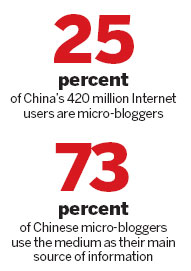Society
Micro blogs have a macro impact in 2010
By Wang Qian (China Daily)
Updated: 2010-12-25 08:57
 |
Large Medium Small |
BEIJING - "Micro blog" made its way to the top of China's 10 Hottest Internet Terms in 2010 as micro-blogging became part of the lives of millions more Chinese netizens.
"WikiLeaks" was also among the 10 hottest terms on the Internet in China, according to the list published this week by a Chinese Wikipedia-style website.
| ||||
Web users looked for a definition of "micro blog" more than 3 million times on Hudong.com this year and sought out the meaning of "WikiLeaks" nearly 800,000 times, the website said on Thursday.
Hudong.com also asked Internet surfers to vote for the most popular terms and both "micro blog" and "WikiLeaks" drew a deluge of votes, it said.
Also high on the list of searches was "showing off my father", a term used in connection with a fatal hit-and-run in which a drunken driver boasted to witnesses that he would not be punished because his father was a high-ranking policeman.
Other terms included the "era of inflation," reflecting the fact that prices have been soaring throughout China, and "vuvuzela trumpet", which was the plastic horn responsible for the droning soundtrack of the 2010 World Cup in South Africa.

The website said its top 10 list reflects what was important this year for Internet users.
It said 2010 left its mark in the cyber world just as it did in the real world with about 73 percent of Chinese micro-bloggers now using the medium as their main source of information.
It said about 94 percent of micro blog users reported that micro-blogging had changed their way of life.
Micro-blogging is a broadcast medium similar to traditional blogging but with a smaller file size of less than 140 Chinese characters and is usually comprised of a short sentence fragment, an image or embedded video that is shared with "fans" of the micro-blogger.
According to a report on China's micro blog market released by news portal sina.com in September, China's micro-blogging population had grown rapidly from more than 54 million people in March to more than 103 million people. Some 63 celebrities' micro blogs have attracted more than 1 million fans.
Today, around 25 percent of China's 420 million Internet users are micro-bloggers, the report said.
Research released by Analysts International, an Internet consultancy organization, said there could be 145 million people using micro blogs in China next year.
With micro-blogging attracting so many people, including officials, scholars and celebrities, it is playing an increasing role in almost every field and acting like a new medium between people, the authorities and news providers.
Authorities in 59 cities and regions - including Chengdu and Yinchuan - launched official micro blogs in 2010. Chengdu's official micro blog drew the most fans, having more than 53,000 as of Thursday.
Micro blogs have been an important conduit for sharing news. The first information about the catastrophic mudslide in Zhouqu, Gansu province, in August was released through Sina Weibo, China's largest micro-blogging service, by Wang Kai, a 19-year-old boy who was later described as a "one-man news agency".

